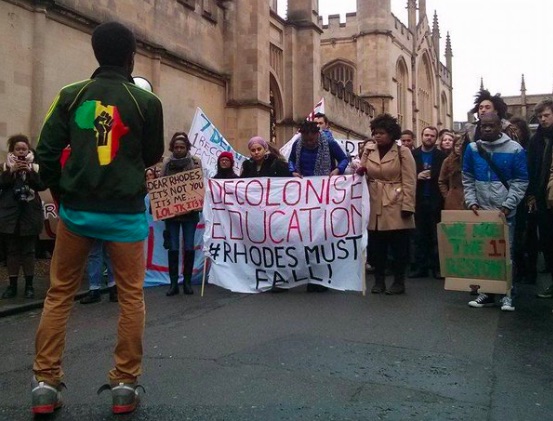Rose is an activist with the Rhodes Must Fall Oxford campaign. She describes the dynamics of the movement and why the campaign is more relevant than ever.
On Wednesday March 9, students and supporters joined together and marched along the historic streets of Oxford. Despite the uninspiring drizzle and near-freezing temperatures, there was undeniably a powerful energy in the air. The call-and-response chants of “De-de-decolonise!” and “Amandla ngawethu!” (“The power is ours!”) rang loud, shouted during the South African anti-apartheid resistance. Inspired by the guided tours through Oxford, the campaigners embarked on an “imperial tour,” which weaved through the glimmering architecture and buildings of Oxford and exposed Oxford’s colonial legacy, ranging from All Souls College, home of the Codrington Library, to Rhodes House, and finally Wellington Square, Oxford’s central administration. Students hung banners from their rooms in solidarity, as well as from the iconic Bridge of Sighs at Hertford College, which was received by thunderous applause and cheers from the protestors.
"It's high time Rhodes Scholarship changed its name, devoted more resources to African reparation." #RhodesMustFall pic.twitter.com/jHQL2s46Dr
— Rhodes Must Fall Ox (@RMF_Oxford) March 9, 2016
Photo: March 9 protest at Oxford University
This was the most recent action taken by the Rhodes Must Fall Oxford movement. Cecil Rhodes was a Victorian industrialist, colonist, and Prime Minister of the Cape colony in South Africa. He left a legacy, which has funded the education of over 7,000 students under the title of the Rhodes Scholarship.
The campaign, which calls for decolonisation of both his image and the scholarship, has described itself as a movement “determined to decolonise the space, the curriculum, and the institutional memory at, and to fight intersectional oppression within Oxford.” Its roots stem from across the globe – the University of Cape Town in South Africa. On March 9, 2015 (one year prior to the Oxford march), a student threw a bucket of human faeces on the statue, and participated in a toyi-toyi dance with other protestors. Gaining both media attention and support, a swift vote saw the removal of the statue one month later. It was a victory in the fight for the decolonisation of education in South Africa.
Solidarity with @RhodesMustFall. #MarchOnRhodes #RhodesMustFall pic.twitter.com/0nvmT78lEZ
— Rhodes Must Fall Ox (@RMF_Oxford) March 9, 2016
Rhodes and others like him represent Britain’s shameful imperial past and colonial exploitation in South Africa. Rhodes himself ordered his predecessors to “treat the natives as a subject people… let them be a subject race” in Zimbabwe, which cruelly was, for a time, Rhodesia. The students’ efforts to remove his image and his legacy from their environment was undeniably a great achievement.
Oxford’s highest student decision-making structure, voted unanimously in February to support RMF in tackling racism at Oxford.
In contrast, Oxford’s journey, both for the students who want the statue gone, and the establishment who want otherwise, has not been an easy one. In November, students protested outside Oriel College, handing over of a petition of more than 2,300 signatures as well as a list of demands. The students demanded the decolonisation of the curriculum (i.e widening the curriculum to include non-white/non-Western voices), as well as the enrollment of students in a way that best accommodates the BME community.
The #MarchOnRhodes is now outside Oriel. We call for removal of statue and reparatory scholarships. #RhodesMustFall pic.twitter.com/J9ygbMVjDB
— Rhodes Must Fall Ox (@RMF_Oxford) March 9, 2016
However, at the end of January, Oriel College revealed it would keep the statue due to growing pressure from donors. By then, the issue had captured the whole university and to some extent the general public. For example, University Chancellor Lord Patten declared that those who disagreed with Rhodes ought to “think about being educated elsewhere.” Australia’s former Prime Minister Tony Abbott called the campaign an act of “moral vanity.” In the British media, one may look no further than the comments left at the bottom of every explosive article, damning the students as “a bunch of over privileged and over indulged idiots.”
This is part of an ongoing and, most importantly, international shift towards identifying and addressing our colonial past.
Nevertheless, RMF leaves Oxford University exposed as it becomes increasingly clear that the student body wants to statue removed. The Oxford Union debate, “Should Rhodes Fall?” saw a majority vote “yes,” and the OUSU, Oxford’s highest student decision-making structure, voted unanimously in February to support RMF in tackling racism at Oxford.
This is part of an ongoing and, most importantly, international shift towards identifying and addressing our colonial past. The day before the march, it was reported that Cambridge University students at Jesus College voted for the university’s bronze Benin cockerel, looted from Africa in the 19th century, to be repatriated. Days before, Harvard Law School announced to scrap its official emblem, which has incorporated the crest of the Isaac Royall and his family, a vicious slave owner, notorious of burning 77 slaves alive.
The Oxford students are not alone in examining the historical legacy of their predecessors. But what is most key about the movement and is often forgotten in face of the cries about the “removal of history” and unnecessary construction of “safe spaces” is that the RMF movement aims to highlight the racial inequality and injustices done to BME students, from direct comments to institutionalised racism which sees them fight for recognition against their white peers.
RMF wants a decolonised Oxford, with an inclusive culture for all individuals. This must be reflected in both the ethnic representation of the student body, as well as the curriculum they are taught, which both continue to be imperative not only at Oxford, but across all British universities. Even if the statue shall not fall, the movement has tapped into vein of international thinking surrounding our colonial past.










